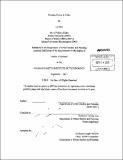Housing policy in China
Author(s)
Gao, Lu, S.M. Massachusetts Institute of Technology
DownloadFull printable version (5.449Mb)
Other Contributors
Massachusetts Institute of Technology. Dept. of Urban Studies and Planning.
Advisor
Tunney Lee.
Terms of use
Metadata
Show full item recordAbstract
In the last three decades, the People's Republic of China (PRC) has managed to replace its welfare-based urban housing system with a market-based housing provision scheme. With such significant housing policy changes, the PRC has successfully expanded urban home ownership and impressively increased per capita housing consumption. The housing market has become one of the major pillar industries in the country's economic boom. However, affordable housing development has been greatly lagging behind the ever-increasing housing needs of a large lower-income population in the country, while housing price bubbles cast a shadow on sustainable economic development in the PRC. The main reasons for such challenges include the inefficiency of financial tools to regulate the housing market; and the discrete interests among the central government, local governments, and real estate developers. Within the context of the ongoing global economic recession after the financial crisis in 2008, it is even more critical to balance the PRC's housing development, both to address the people's housing needs, and to maintain sustainable growth.
Description
Thesis (S.M.)--Massachusetts Institute of Technology, Dept. of Urban Studies and Planning, 2011. Cataloged from PDF version of thesis. Includes bibliographical references (p. 60-64).
Date issued
2011Department
Massachusetts Institute of Technology. Department of Urban Studies and PlanningPublisher
Massachusetts Institute of Technology
Keywords
Urban Studies and Planning.